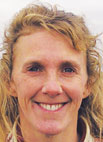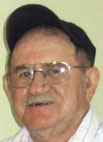
When visiting a doctor’s office, it is not uncommon to hear about the importance of good nutrition — the value of vitamins or the merit of minerals — and a visit to the office of Doctor Shannah Cassatt is no exception. The only difference is that Shannah is a veterinarian. At the Country Care Clinic, balance is one of Shannah’s biggest concerns.
She balances animals' diets, and she balances time between her clinic, her registered Charolais herd and her family. Just as she embraces alternatives in treating sick animals, she makes time even during busy days. Shannah said her clinic is “a family business,” partly because she takes her family with her. The family travels to many fairs every summer; Shannah shows cattle at the Ozark Empire Fair and at the state fair in Sedalia, Mo. Her oldest daughter shows bottle calves at local fairs.
Her daughters Tannah, four, and Lannah, one-year-old, are often in the clinic or with their mother as she travels. Tannah occasionally assists by holding tools or calming the animal her mother is treating. Her clients understand and embrace the way she includes her family. Often, clients will offer to take care of the children while Shannah takes care of their animals.
Her husband Mike Grigg also has his own business. He operates Country Care Construction. They admitted that having two businesses is hard, but they feel they are very fortunate. “God has taken care of us,” Mike said.
Shannah graduated from the veterinary school at MU in 1998 and has been practicing ever since. She worked at Warrensburg, Mo., and at an equine clinic in Ozark, Mo., before returning home to start her clinic near Oronogo, Mo. She also serves as an on-site veterinarian at the Ozark Empire Fair.
Raising Charolais came naturally to Shannah. Her parents raised Charolais, and she was given her first cow over 25 years ago. Since then, her herd has grown to 70 or 80 cows spread over 180 acres. She owns some of the land, but also rents pasture ground in the area. Approximately half of her herd is registered. She also raises bulls and grass steers. Some of the steers are butchered for her family or for customers, but most of the steers, as well as her cull cows, are sent to market.
Shannah tries to breed for specific traits in her registered herd. Like most producers, she watches for cattle that grow rapidly. She also tries to keep cows that calve easily and have high milk production. She likes docile cows with good temperaments. Currently, one is serving as a milk cow for the family.
Many of Shannah's animals serve multiple purposes. She has many pets, including horses, mini-ponies, chickens, cats, dogs, ducks, turkeys, a sheep and a goat. Her animals do more than provide pleasure, they give her meat, milk and eggs. Several provide valuable services for the clinic. The goat, along with a large chocolate Labrador and several cats are blood donors for other animals at the clinic.
Though Shannah uses modern medical techniques at the clinic, she also encourages alternative and herbal remedies. When possible, she utilizes kinesiology to diagnose animals for ailments instead of using costly or invasive tests. She feels that many animals become sick because of dietary deficiencies. She often prescribes whole food or herbal supplements along with modern, western medicine. She is proud of the fact that she has healed several animals with alternative medicine, that other veterinarians were unable to cure with modern medicine.
Shannah feels that many health problems could be eliminated by a better diet. Her number one tip for cattle producers is that “Better nutrition creates healthier calves and better production.” She also said that it is important for cattle to have access to quality minerals as well as having an adequate supply of salt. She stressed the importance of fertilizing pastures so that cattle are able to forage for the nutrients they need.
Though she has adapted to the busy schedule, she readily gives her clients advice that could put her out of a job. She said, “God made animal’s bodies, and ours, to be able to heal, and so if we give an animal the proper nutrition, that animal’s body will mend.”







